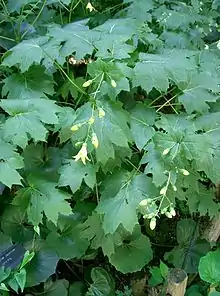| Kirengeshoma palmata | |
|---|---|
 | |
| Scientific classification | |
| Kingdom: | Plantae |
| Clade: | Tracheophytes |
| Clade: | Angiosperms |
| Clade: | Eudicots |
| Clade: | Asterids |
| Order: | Cornales |
| Family: | Hydrangeaceae |
| Genus: | Kirengeshoma |
| Species: | K. palmata |
| Binomial name | |
| Kirengeshoma palmata Yatabe | |
Kirengeshoma palmata, the yellow wax bells, is a species of flowering plant in the family Hydrangeaceae, native to Japan and eastern China (Huangshan and Tianmushan).[1] It is a clump-forming herbaceous perennial growing to 60–120 cm (24–47 in) tall by 75 cm (30 in) broad, with sycamore-like palmate leaves, and fleshy, pale yellow flowers borne on slender maroon stems in late summer. It is a calcifuge, suitable for cultivation in a shady, moist location in acid soil.[2]
The Koreana Group of Kirengeshoma palmata has received the Royal Horticultural Society’s Award of Garden Merit.[3]
References
- ↑ Huang Shumei (Hwang Shu-mei), Bruce Bartholomew. "Kirengeshoma palmata". Flora of China. Missouri Botanical Garden, St. Louis, MO & Harvard University Herbaria, Cambridge, Massachusetts. Retrieved 15 June 2015.
- ↑ RHS A-Z encyclopedia of garden plants. United Kingdom: Dorling Kindersley. 2008. p. 1136. ISBN 1405332964.
- ↑ "Kirengeshoma palmata Koreana Group". www.rhs.org. Royal Horticultural Society. Retrieved 5 September 2023.
This article is issued from Wikipedia. The text is licensed under Creative Commons - Attribution - Sharealike. Additional terms may apply for the media files.
